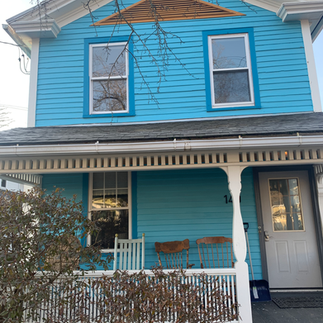The Art and Craft of Participatory Story Making, with Aline Gubrium, UMass, Amherst
- Jonathan Isserow
- Feb 28, 2024
- 2 min read

It was a true delight to meet someone who's interventions and writings are driving forward the field of participatory creative research. Her book, along with Krista Harper and Marty Otanez Participatory Visual and Digital Research in Action, has served as a catalyst for my Fellowship. After many years of correspondence, there was a sense of occasion to finally meet in person!
Aline Gubrium is Professor of Community Health Education at UMass, Amherst, who has been using a range of creative methodologies from Digital Story making, Photovoice, podcasts and body-mapping, to engage and address health inequalities with variety of groups, across different settings. This includes working to address adolescent sexual and reproductive health inequalities in the Massachusetts area, captured in The STRIVE PROJECT . Another of her interventions is the Hear our Stories project. that uses digital storytelling to examine sexual and reproductive health disparities among young parenting Latinas in Holyoke, Massachusetts. Interestingly, Aline is also driving forward the field theoretically through the development of Critical Narrative Inquiry whereby:
participants’ engagement in the storytelling process enables them to collaboratively interrogate and potentially address prior trauma, bolster a sense of social support and solidarity, and potentially recalibrate stigmatizing conversations about them.
It enables participants to become active agents in the representation of their own lived experience, where the honouring and witnessing of the others' story can be transformative. I was grateful for the opportunity to discuss with Aline the benefits, constraints and ethical dimensions of this methodology. This includeS issues around time and resource intensity of the work; technological access and digital competencies of the participants to navigate editing programmes and ethical dilemmas around digital footprint and legacy. Despite this, there are also many productive opportunities that Digital Story making presents. There can be great aesthetic pleasure in the art and craft of developing the story. The ensuing digital artefact can have a life of its own, that other people may learn from the experience and it can potentially inform policy. On a personal level, it also offers a means to integrate the fields of art psychotherapy, filmmaking and men's mental health into a powerful medium that can literally generate a multiplicity of narratives of masculinity, back in the UK. Thank you so much, Aline for your generosity in our very informative meeting.















Comments